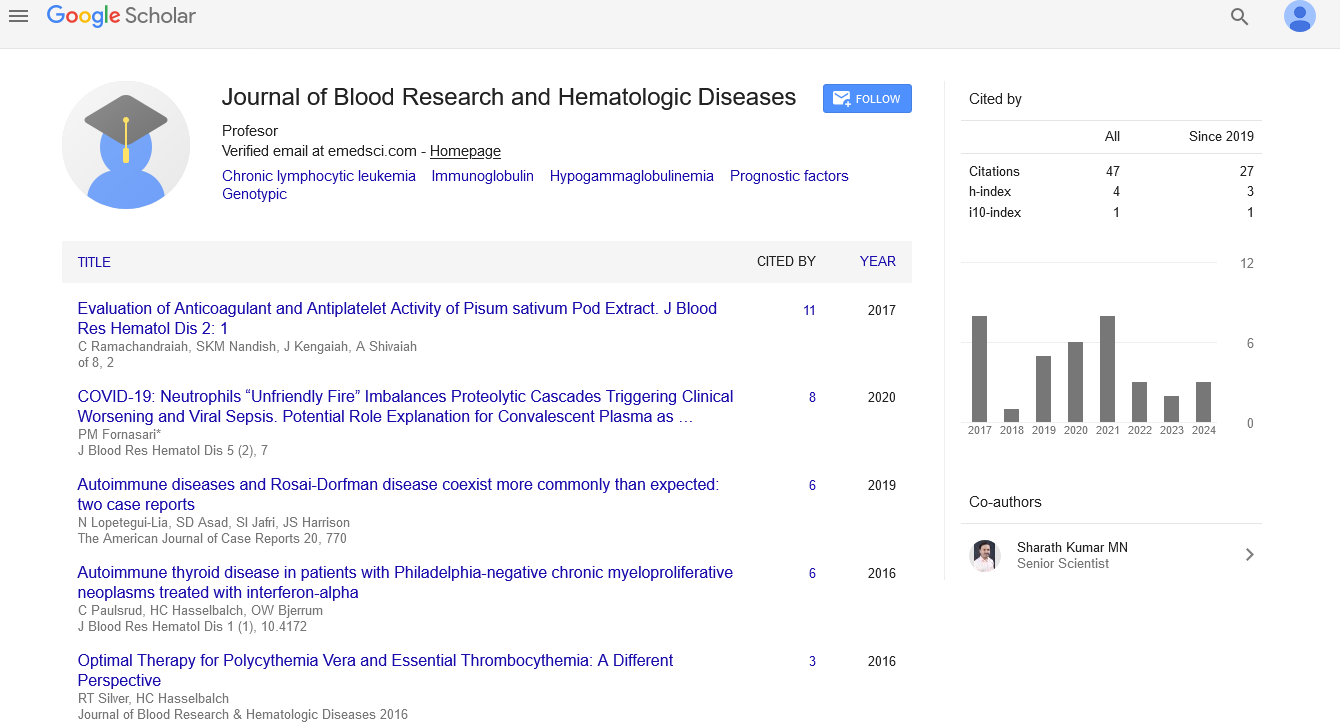Commentary, J Blood Res Hematol Dis Vol: 8 Issue: 3
Blood Group Antigen Genotyping in Immunohematology: Current Status and Future Prospects
Sophia Ramirez*
1Department of Clinical Hematology, Centro Hospitalar Universitário do Porto, Porto, Portugal
*Corresponding Author: Sophia Ramirez,
Department of Clinical Hematology, Centro
Hospitalar Universitário do Porto, Porto, Portugal
E-mail: sophia.ramirez@chu.com
Received date: 28 August, 2023, Manuscript No. JBRHD-23-115306;
Editor assigned date: 30 August, 2023, PreQC No. JBRHD-23-115306 (PQ);
Reviewed date: 13 September, 2023, QC No. JBRHD-23-115306;
Revised date: 21 September, 2023, Manuscript No. JBRHD-23-115306 (R);
Published date: 29 September, 2023, DOI: 10.4172/jbrhd.1000177
Citation: Ramirez S (2023) Blood Group Antigen Genotyping in Immunohematology: Current Status and Future Prospects. J Blood Res Hematol Dis 8:3.
Description
Immunohematology, the branch of transfusion medicine that deals with blood group systems, has made significant advancements over the years. Traditionally, blood typing and crossmatching were performed using serological methods, but the advent of molecular biology techniques has revolutionised this field. Blood group antigen genotyping, a molecular approach to characterising blood groups, has become increasingly important in transfusion medicine.
Blood group antigens
Blood group antigens are proteins or carbohydrates present on the surface of red blood cells. These antigens play a vital role in blood transfusion compatibility, as mismatched antigens can lead to adverse reactions. The ABO and RhD blood group systems are the most wellknown, but there are over 300 other blood group systems with varying antigenic specificities.
Historical methods vs genotyping
Traditional serological methods for blood typing, such as the agglutination test, rely on the interaction between antibodies and antigens. These methods are sensitive but can be time-consuming and subject to human error. Moreover, they may not be suitable for resolving complex antigen profiles or rare blood groups.
Blood group antigen genotyping, on the other hand, involves the detection of specific genetic markers associated with blood group antigens. This technique offers several advantages:
Accuracy: Genotyping provides precise information about an individual's blood group antigens, reducing the risk of human error associated with serological testing.
Resolution: Genotyping can distinguish between closely related antigens within a blood group system, allowing for a more comprehensive characterization.
Speed: Genotyping can be performed more rapidly than traditional serological tests, enabling quicker patient care decisions.
Compatibility: It helps identify rare blood groups and facilitates finding compatible donors for patients with specific antigen requirements.
Current status of blood group antigen genotyping
The field of blood group antigen genotyping has evolved significantly over the past few decades. Several methods are commonly used today:
Polymerase Chain Reaction (PCR): PCR-based methods are widely employed to amplify specific Deoxy-ribo Nucleic Acid (DNA) regions associated with blood group antigens. This technique allows for the simultaneous detection of multiple antigens.
DNA microarrays: DNA microarrays, also known as DNA chips, enable high-throughput genotyping by immobilising DNA probes specific to blood group antigens on a solid surface. This method is efficient for large-scale genotyping.
Next-Generation Sequencing (NGS): NGS technologies have enhanced the precision and speed of blood group antigen genotyping. They can sequence multiple genes simultaneously and detect rare variants.
Allele-specific PCR: This method specifically targets known alleles associated with blood group antigens, providing highly accurate results.
Applications of blood group antigen genotyping
Blood group antigen genotyping finds applications in various clinical settings:
Blood transfusion: Genotyping ensures the selection of compatible blood donors, reducing the risk of transfusion reactions. It is particularly valuable for patients with rare blood groups.
Prenatal testing: Genotyping can determine the foetal blood group antigen profile, helping manage pregnancies involving Rh incompatibility.
Organ and stem cell transplantation: Matching donor and recipient blood group antigens is essential to minimise graft rejection. Genotyping aids in identifying compatible donors.
Forensic analysis: Blood group antigen genotyping is used in forensic investigations to determine the origin of blood samples found at crime scenes.
Future prospects
The future of blood group antigen genotyping holds several exciting possibilities:
Personalised medicine: Genotyping can be integrated into personalised medicine, allowing healthcare providers to tailor treatment plans based on an individual's blood group antigen profile.
Artificial blood: The ability to precisely manipulate blood group antigens through genotyping may pave the way for the development of universal donor blood or artificial blood substitutes.
Rare blood group identification: Genotyping will continue to play a vital role in identifying and cataloguing rare blood groups, making it easier to find compatible donors.
Genomic editing: Advancements in gene editing technologies like Clustered Regularly Interspaced Short Palindromic Repeats-CRISPRassociated protein 9 (CRISPR-Cas9) may enable the modification of blood group antigens, potentially expanding the pool of compatible donors.
Conclusion
Blood group antigen genotyping has emerged as a powerful tool in immunohematology, offering improved accuracy, speed, and versatility compared to traditional serological methods. As technology continues to advance, the field is poised for further growth, with applications in personalized medicine, artificial blood development, and rare blood group identification. By harnessing the potential of genotyping, transfusion medicine will continue to advance, ensuring safer and more effective blood transfusions and medical treatments for patients worldwide.
